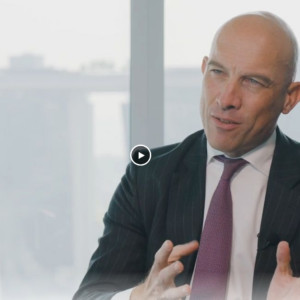
UBP is recommending a 15 per cent allocation to alternatives in a balanced portfolio, despite its experiences during the financial crisis
Over breakfast in an eighth-floor suite of the Dorchester Hotel in Park Lane, the cream of UBP’s “talent around the table” were busy unveiling a new menu of alternative assets for investors, with hedge funds back to their former status as dish of the day.
The Geneva-based private bank – abbreviated from Union Bancaire Privée – was conducting a London charm offensive for its newly launched alternative investment solutions (AIS) business, featuring AIS co-heads John Argi and Kier Boley alongside deputy asset management boss Jean-Luc Eyssautier, in addition to guest portfolio management veterans from external firms.
This felt like a landmark event organised by the Swiss bank, which suffered so much from the global financial crisis that its funds unit came close to collapse in 2009, after unprecedented outflows decimated the asset base. And here it was, once again brazenly launching itself into the business where it got so badly burned.
Love affair gone wrong
The associated handout, detailing the bank’s official history, makes interesting reading. The timeline of milestones starts with the founding of the bank in 1969 by Edgar de Piccioto, signposting the launch of its first fund of hedge funds in 1986, along the road to becoming the “largest hedge fund allocator worldwide” in 2008, when UBP was at the height of its powers. Its subsequent fall from grace – when the bank got so carried away in its love affair with hedge funds that it failed to note warning signs – is not however mentioned.
As customers shocked by the combination of a liquidity squeeze and the Madoff fraud voted with their feet, hedge funds managed by UBP plunged from $60bn in 2007 to $25bn in 2010, with an accompanying collapse in profits, leading the bank to refocus on traditional long-only products and managing assets from acquisitions. The bank, however, stood by its clients, compensating them for half of any investments made with Madoff and also agreeing to pay $500m in 2010 to the trustee for distribution to the scandal’s victims.
The strategy of Guy de Piccioto – son of founder Edgar – switched to substituting the disappeared hedge fund assets with more predictable business, at a lower cost, for the next decade.
But the global economic climate is once more favouring hedge funds, claims the bank’s AIS team, with 25 “dedicated” staff now managing $16bn in alternative assets for private and institutional clients. Despite the troubles of 2008 onwards, UBP calls the 1990 to 2009 period the “golden years”, when positive real interest rates fuelled a “very attractive risk/reward” trade-off. This was followed by the “underperformance years” of 2010 to 2019, when central banks rather than markets priced risk, supressing asset volatility through quantitative easing.
The latest era, starting in 2020, is a “time to reconsider”, says the bank, typified by an inflationary environment alongside higher interest rates triggering a “new market regime”. Clients are being told things will be different this time round. “There is a big thing that has changed, which is institutionalisation of the asset class,” says Mr Argi. “Today, we have regulated, transparent, liquid strategies. Before, these were delivered in an offshore format through different jurisdictions, with a much more opaque structure.”
He acknowledges that clients may need some convincing to return to the fold. “We felt that we have an edge finding good managers, that do not have an institutional European presence. We can put them in the right format of weekly or daily liquidity, with a greater amount of transparency,” he says, hoping to convince sceptics that UBP can provide “a format which gives you comfort”.
Toes in the water
Those who are “scared to get back” are being wooed with a fund of funds under the regulated, cross-border EU ‘Ucits’ banner, offering daily liquidity. “They can dip their toe in the water and try it for a month or a year, and if you feel uncomfortable about the situation, you can get your money within one week,” suggests Mr Argi. He also promises better due diligence of a hedge funds universe of up to 9,000 funds, eventually whittled down to a “research universe” of 900 funds, managed by an “approved list” of 110 managers. Interestingly, this focus on due diligence was also a key selling point for the bank prior to the events of 2008 onwards.
Like its neighbouring alternative specialist private bank in Geneva, Banqye Syz, UBP also hints that clients suffered hedge fund losses because they invested incorrectly, seeking to make fast profits and lacking a long-term strategy.
“Hedge funds should always be seen as a long-term buy-to-hold investment, but often you get clients or investors looking at hedge funds as tactical trading opportunities,” says Mr Boley. “In fact, we think buy-to-hold for a minimum of three years is the way for the investment to generate an attractive realised return.”
Cyclical game
The bank is now recommending an adjustment away from the traditional 60:40 equities to bonds balanced portfolio, suggesting a 15 per cent alternatives weighting.
But is there anything wrong with banks and investment groups revisiting sectors where they encountered existential problems in the past?
Commentators point out that asset and wealth management is a cyclical game. Big name players often pull out of markets, specialisms or territories in tough times and then come back once they see competitors making money once more. It seems many potential clients would expect a Geneva wealth management player such as UBP to have a vibrant alternatives business.
“What UBP is doing means it is in positive revival mode; asset managers and private banks go through cycles, you get better over time and through your experiences,” says Ray Soudah, founder of Zurich-based consultancy MilleniumAssociates and a former board member of several banks.
“A lot of those old clients have disappeared by now and been well compensated by the generous response of UBP. Time has healed the history, the people are gone or more relaxed, and a good new team is in place. I don’t see it as negative or silly, it’s more natural.”
As UBP’s breakfast guests looked out from their West End vantage point on a cold February day, the view summed up the story. The reappearance of construction cranes suggested some return in fragile confidence. But the morning mist shrouding the city foretold an uncertain future.



